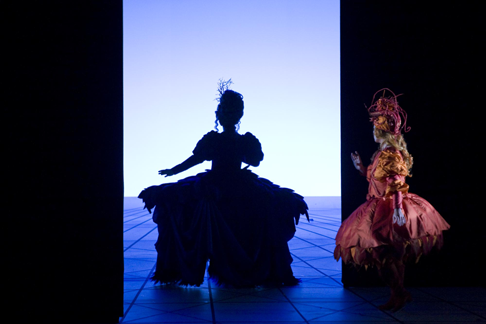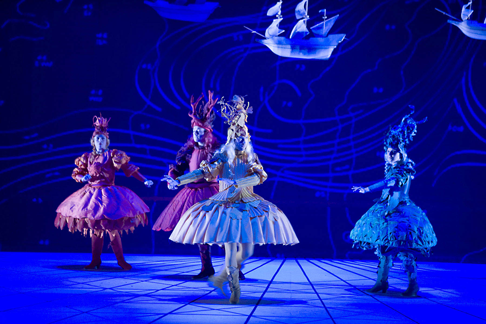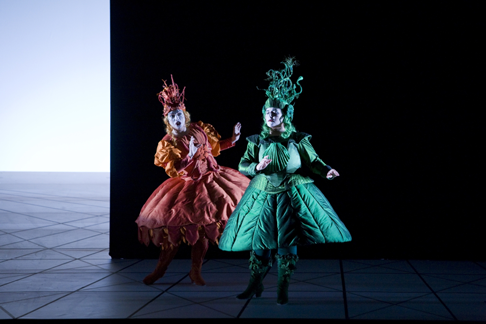![Marina De Liso as Arsace [Photo by Marco Caselli Nirmal]](http://www.operatoday.com/Partenope_Ferrara_01.png)
01 Feb 2009
Partenope in Ferrara
The Greek princes Arsace (alto) and Armindo (alto) are seeking handsome Queen Partenope (soprano), who has just founded the city of Naples, in marriage.
English Touring Opera are delighted to announce a season of lyric monodramas to tour nationally from October to December. The season features music for solo singer and piano by Argento, Britten, Tippett and Shostakovich with a bold and inventive approach to making opera during social distancing.
This tenth of ten Live from London concerts was in fact a recorded live performance from California. It was no less enjoyable for that, and it was also uplifting to learn that this wasn’t in fact the ‘last’ LfL event that we will be able to enjoy, courtesy of VOCES8 and their fellow vocal ensembles (more below …).
Ever since Wigmore Hall announced their superb series of autumn concerts, all streamed live and available free of charge, I’d been looking forward to this song recital by Ian Bostridge and Imogen Cooper.
The Sixteen continues its exploration of Henry Purcell’s Welcome Songs for Charles II. As with Robert King’s pioneering Purcell series begun over thirty years ago for Hyperion, Harry Christophers is recording two Welcome Songs per disc.
Although Stile Antico’s programme article for their Live from London recital introduced their selection from the many treasures of the English Renaissance in the context of the theological debates and upheavals of the Tudor and Elizabethan years, their performance was more evocative of private chamber music than of public liturgy.
In February this year, Albanian soprano Ermonela Jaho made a highly lauded debut recital at Wigmore Hall - a concert which both celebrated Opera Rara’s 50th anniversary and honoured the career of the Italian soprano Rosina Storchio (1872-1945), the star of verismo who created the title roles in Leoncavallo’s La bohème and Zazà, Mascagni’s Lodoletta and Puccini’s Madama Butterfly.
Evidently, face masks don’t stifle appreciative “Bravo!”s. And, reducing audience numbers doesn’t lower the volume of such acclamations. For, the audience at Wigmore Hall gave soprano Elizabeth Llewellyn and pianist Simon Lepper a greatly deserved warm reception and hearty response following this lunchtime recital of late-Romantic song.
Collapsology. Or, perhaps we should use the French word ‘Collapsologie’ because this is a transdisciplinary idea pretty much advocated by a series of French theorists - and apparently, mostly French theorists. It in essence focuses on the imminent collapse of modern society and all its layers - a series of escalating crises on a global scale: environmental, economic, geopolitical, governmental; the list is extensive.
For this week’s Live from London vocal recital we moved from the home of VOCES8, St Anne and St Agnes in the City of London, to Kings Place, where The Sixteen - who have been associate artists at the venue for some time - presented a programme of music and words bound together by the theme of ‘reflection’.
'Such is your divine Disposation that both you excellently understand, and royally entertaine the Exercise of Musicke.’
Amongst an avalanche of new Mahler recordings appearing at the moment (Das Lied von der Erde seems to be the most favoured, with three) this 1991 Mahler Second from the 2nd Kassel MahlerFest is one of the more interesting releases.
‘And there was war in heaven: Michael and his angels fought against the dragon; and the dragon fought and his angels, And prevailed not; neither was their place found any more in heaven … that old serpent … Satan, which deceiveth the whole world: he was cast out into the earth, and his angels were cast out with him.’
If there is one myth, it seems believed by some people today, that probably needs shattering it is that post-war recordings or performances of Wagner operas were always of exceptional quality. This 1949 Hamburg Tristan und Isolde is one of those recordings - though quite who is to blame for its many problems takes quite some unearthing.
There was never any doubt that the fifth of the twelve Met Stars Live in Concert broadcasts was going to be a palpably intense and vivid event, as well as a musically stunning and theatrically enervating experience.
‘Love’ was the theme for this Live from London performance by Apollo5. Given the complexity and diversity of that human emotion, and Apollo5’s reputation for versatility and diverse repertoire, ranging from Renaissance choral music to jazz, from contemporary classical works to popular song, it was no surprise that their programme spanned 500 years and several musical styles.
The Academy of St Martin in the Fields have titled their autumn series of eight concerts - which are taking place at 5pm and 7.30pm on two Saturdays each month at their home venue in Trafalgar Square, and being filmed for streaming the following Thursday - ‘re:connect’.
The London Symphony Orchestra opened their Autumn 2020 season with a homage to Oliver Knussen, who died at the age of 66 in July 2018. The programme traced a national musical lineage through the twentieth century, from Britten to Knussen, on to Mark-Anthony Turnage, and entwining the LSO and Rattle too.
With the Live from London digital vocal festival entering the second half of the series, the festival’s host, VOCES8, returned to their home at St Annes and St Agnes in the City of London to present a sequence of ‘Choral Dances’ - vocal music inspired by dance, embracing diverse genres from the Renaissance madrigal to swing jazz.
Just a few unison string wriggles from the opening of Mozart’s overture to Le nozze di Figaro are enough to make any opera-lover perch on the edge of their seat, in excited anticipation of the drama in music to come, so there could be no other curtain-raiser for this Gala Concert at the Royal Opera House, the latest instalment from ‘their House’ to ‘our houses’.
"Before the ending of the day, creator of all things, we pray that, with your accustomed mercy, you may watch over us."
![Marina De Liso as Arsace [Photo by Marco Caselli Nirmal]](http://www.operatoday.com/Partenope_Ferrara_01.png)
The Greek princes Arsace (alto) and Armindo (alto) are seeking handsome Queen Partenope (soprano), who has just founded the city of Naples, in marriage.
Partenope is attracted to Arsace, without knowing that he has previously abandoned Rosmira, who now — disguised as a chieftain under the fictional name of Eurimene from Armenia — arrives in Naples with the aim of winning him back. A third prince, Emilio from the nearby reign of Cumae (tenor), declares war on Partenope, offering marriage for peace. His attack, however, is easily rebuked by the joint forces of the queen and her lovers, so Emilio is detained at Partenope’s court as in a chivalrous prison camp of sorts. Rosmira/Eurimene secretly confronts Arsace demanding that he keep her true identity covered, then provokes him publicly in every possible manner. In the end, she challenges him to a duel in a court of honor, but must withdraw as he puts the condition that they fight stripped to the waist. Partenope decides to marry Armindo, orders that repentant Arsace be reunited to Rosmira and sends back Emilio to Cumae on friendly terms.
A bit too madcap by the average standard of early opera seria, Silvio Stampiglia’s libretto was written for Naples in 1699 and subsequently set by several composers. Rather than in outstanding literary or dramatic merit, the secret of its popularity may lie in the variety of situations and the panoply of stock affetti associated to them. One would like to call Partenope a Baroque sitcom, now and then on the verge of vaudeville. A radical admirer, none less than Edward J. Dent, affected to find in it something of a Shakespearean atmosphere, apparently referring to the bittersweet climate of The Twelfth Night rather than to the Bard’s tragedies or history plays. As recently argued by the British Handel scholar David Vickers: ‘The plot offers ample scope for emotional intensity, insightful characterization, wit, sexual innuendo, and profound despair’. This is probably what most appealed to Handel, who, after an abortive attempt in 1726, succeeded to present his own setting of Partenope to the London public in 1730. After two not-too-successful runs in that year at the King’s Theatre, and a nearly disastrous revival in 1737 at the Covent Garden, Partenope disappeared for two centuries. Modern revivals in German and English translations started at the Göttingen Handel Festival in 1935 and went forth, if very sparsely, until 1998, when the original Italian libretto resurfaced in Cooperstown, NY, and in New York City. The present staging at Ferrara — scheduled to circulate later in Modena, Naples and Montpellier, France — was, believe it or not, the opera’s Italian premiere ever.
To devout Handelians like myself (as opposed to sane folk who would object to sitting at the opera for three-and-a-half hours), the experience of hearing live an almost uncut score of the Harmonious Blacksmith is increasingly rare and a potential source of delight. It did not happen this time. In addition to its unusually high number of arias, Partenope has a remarkably prominent number of ensembles (eight, including two choruses), two accompanied recitatives and some flamboyant instrumental music of a warlike character. Ottavio Dantone’s performing version, essentially based on Handel’s first version of three, pruned 8 out of 48 set pieces: four arias for Arsace, as many for Partenope, and one for Armindo — which seems a generous appeasement with modern listening habits.
 Elena Monti as Partenope, Sonia Prina as Rosmira
Elena Monti as Partenope, Sonia Prina as Rosmira
Nevertheless, there was still much left to cherish. First of all, a classy ensemble of voices, all well versed in period performing practice. A trio of ladies shared the best applause: as the de-facto protagonist Arsace, Marina De Liso sketched an enigmatic and irresolute anti-hero; nonetheless, her cleanly secure intonation, refined uttering and elegant coloratura were glorious throughout. As Rosmira/Eurimene, Sonia Prina towered as the relentless powerhouse she usually is onstage, sparking a regular ovation in her defiant aria ‘Io seguo sol fiero’ with obbligato horns and oboes. Valentina Varriale, as the moonstruck Armindo who finally gets the girl, impressed for the sheer beauty of her color, dark and fully fleshed-out. The quiet lilt of her heart-rending andante ‘Non chiedo, o luci vaghe’ conveyed all the elegy of selfless love, quite Arcadian-style.
 Sonia Prina as Rosmira, Gianpiero Ruggeri as Ormonte,
Cyril Auvity as Emilio, Marina De Liso as Arsace
Sonia Prina as Rosmira, Gianpiero Ruggeri as Ormonte,
Cyril Auvity as Emilio, Marina De Liso as Arsace
In the title role, Elena Monti embodied the seductive, authoritative and slightly vindictive nature of her character almost to perfection. Depriving her of her signature aria ‘Qual farfalletta’, towards the end of Act II, was indeed insensitive. Both Emilio and Partenope’s chamberlain Ormonte (bass) are deadpan roles, yet their respective performers Cyril Auvity and Gianpiero Ruggeri came out egregiously for their assured technique, also showing a firm grip of style requirements. In the remote confrontation with the role-creator Annibale Fabri (a virtuoso from Bologna who managed to become a lone tenor star in the age of castrati), Auvity had to struggle hard with a terrific range and treacherous coloratura. He emerged unscathed, albeit switching to a peculiar mixed utterance at the upper and lower ends of his tessitura. Who knows whether Fabri, described by a contemporary British observer as ‘a very good master of musick’ did the same?
 Sonia Prina as Rosmira, Valentina Varriale as Armindo
Sonia Prina as Rosmira, Valentina Varriale as Armindo
Giuseppe Frigeni’s integrated light-set-direction design and Regina Martino’s costumes provided a lesson of how to approach early opera without either irreverent gimmicks or cheap archaeological historicism. Their easily recognizable color codes, applied to studies in abstract perspective resembling chessboards, their luxuriant headpieces and peacock-shaped gowns for everybody (whether males, females or cross-dressers), conveyed a quintessential Spirit of Baroque — somewhat near to the Beijing Opera, where a single flag stands for ten thousand warriors or a model ship for whole fleets. Body language and perusal of stage space did fit admirably into the frame.
Antonio Florio and his (Naples-based) Pietà dei Turchini were slated to steer this important production. In the end, they declined because of budget disagreements, so the baton passed onto Dantone, whose period band Accademia Bizantina can stand on equal footing with any such ensemble in Italy. Indeed, they brought the wondrous machine to triumph and were awarded full honors; only a few skipped notes in the natural brasses gave evidence of limited rehearsing time, but this may improve later in the tour.
Carlo Vitali